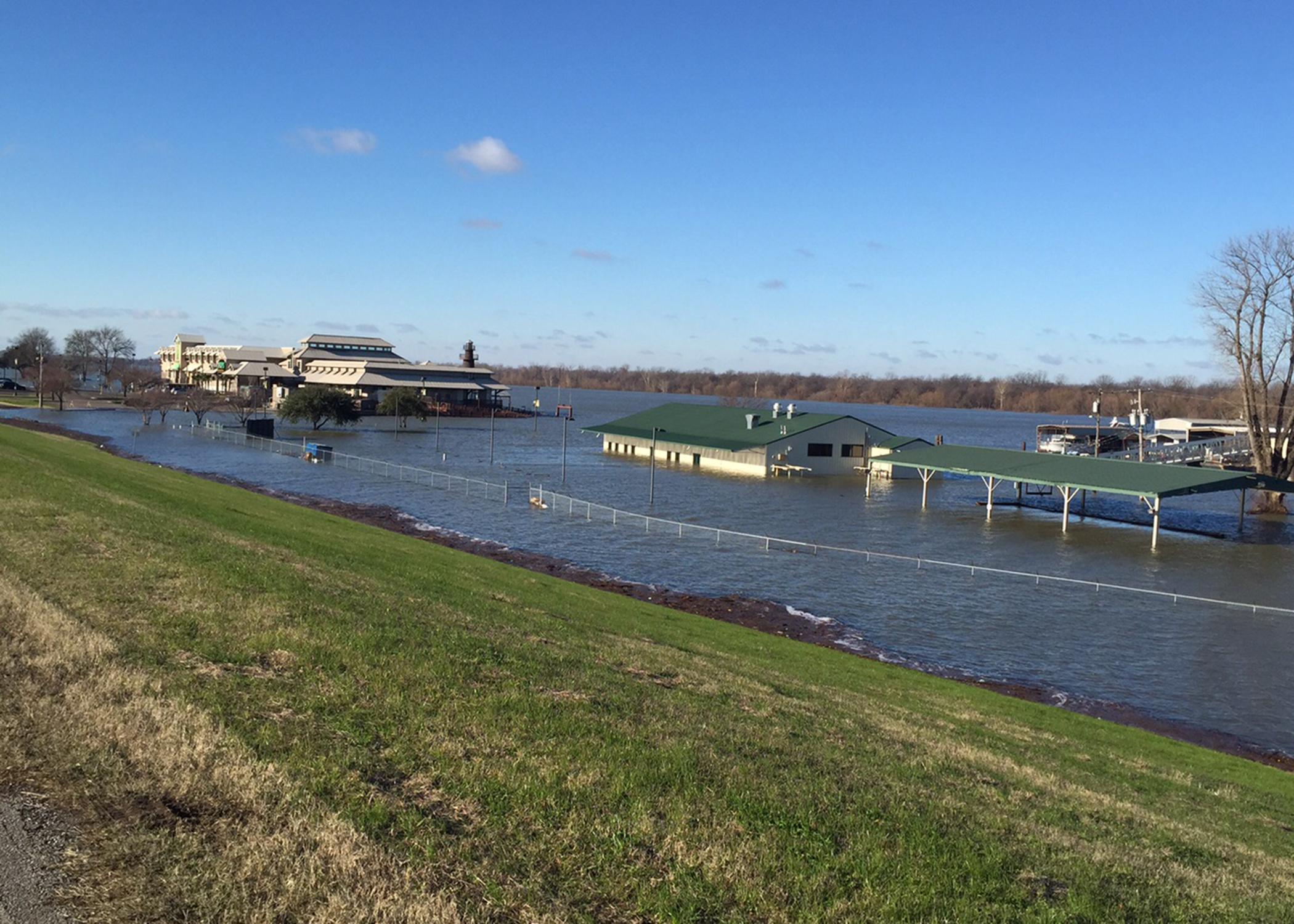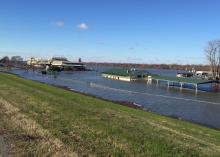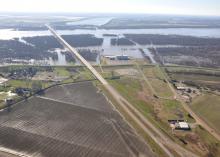Information Possibly Outdated
The information presented on this page was originally released on February 5, 2016. It may not be outdated, but please search our site for more current information. If you plan to quote or reference this information in a publication, please check with the Extension specialist or author before proceeding.
January river flooding has impacts on state
GREENVILLE, Miss. -- Mississippi River flooding in January set all-time records, but dropping water levels may mean the river will have enough capacity to accept typical spring rains without triggering atypical flooding.
Peter Nimrod, chief engineer with the Mississippi Levee Board in Greenville, said the Greenville January gauge reading of 56.2 feet set a record. The normal depth for that month is about 30 feet.
“We’ve had high water in January before, but not this high,” Nimrod said. “We pretty much set the record everywhere on the Mississippi River in January. River levels have been falling since late January, and the river should fall to an average of 28 to 30 feet.”
Mississippi River levels were unusual for much of 2015. The river is often high from January to June or July, never from August to December.
“On Aug. 1, 2015, we were above flood stage. This was the first time that happened since we’ve been keeping records,” he said. “The river was very high in December, but it didn’t hit flood stage until Jan. 1, 2016.”
The Mississippi River commonly floods in March and April. River monitors want water levels to be low enough during the first months of the year to allow the river to absorb spring rains.
“There is a potential problem this year if the river doesn’t come down enough but stays high,” Nimrod said. “We want to make sure there is enough storage on the river for the spring rains.”
The biggest impact to date has been on wildlife. In several parts of the state, the Mississippi Department of Wildlife, Fisheries and Parks closed hunting seasons early for all game but waterfowl. Certain hunting seasons will open again once the Mississippi River falls below set levels.
“The greatest impact was to our wildlife industry, which is massive down here,” said David Carter, Mississippi State University Extension agent in Adams County. “When west of Highway 61 was shut off, it impacted a large part of our hunting lands.”
Bill Hamrick, MSU wildlife biologist in the Department of Wildlife, Fisheries and Aquaculture, said Mississippi River flooding displaces deer, and they often gather in nonflooded farmland, such as winter wheat fields.
“In a typical year, water levels inside the mainline levees normally rise and fall for brief periods, and animals move back and forth between areas of high and low ground,” Hamrick said. “This year, there’s been high levels of rainfall both locally and in states further upstream, so the scale and duration of flooding is greater than what we would see in a typical year.”
Young and very old animals are most vulnerable to death because of flood conditions, but many animals survive.
The 2011 flood was during the spring and didn’t have a huge negative impact on wildlife species. Outside the main levees there was plenty of food and rivers in the interior Delta were not flooding. This year is different because there is interior flooding and late winter food is pretty scarce. So, it stands to reason this flood will be tougher on wildlife than the 2011 flood.
Hunting seasons are often closed because of large-scale flooding because animals are limited in where they can seek food and refuge. This precaution is also taken to limit disturbance and damage to levees that can result in breaches.
“Hunting animals under such circumstances violates principles of fair chase,” Hamrick said. “Plus, we don’t know the impact flooding will have on populations, so we don’t want to further reduce populations by increasing pressure on them and continuing to harvest them.”
Hunting in flooded areas is also limited because of public safety concerns that hunters could become lost or trapped in an area or even drown. Hunting animals concentrated in small areas can bring hunters dangerously close to one another, resulting in firearms safety concerns.
Mississippi River flooding has a cascade of effects on other aspects of life in the state.
Erick Larson, grain crops agronomist with the Mississippi State University Extension Service, said early river flooding can swamp farmland planted in winter wheat.
“Wheat acreage this season is far less than normal, which may limit potential flood damage,” Larson said. “If floodwater recedes prior to planting season, the effect on summer crops should be minimal.”
Jon Carson, Extension agent in Issaquena and Sharkey counties, said only a few acres of wheat were under water in January.
“If the U.S. Army Corps of Engineers is forced to keep the Steele Bayou flood control structure located in the south Delta closed, the flood waters will begin to interfere with spring operations such as planting, herbicide applications, bed preparation and more,” Carson said.
Farther south, Carter said the county’s high elevation keeps most farm acreage safe from flooding.
“However, most of our flooded areas are farmlands in the area known as Anna’s Bottom and several other low areas with wheat planted,” Carter said. “A few cattle farmers also had to move their herds because of rising water.”









